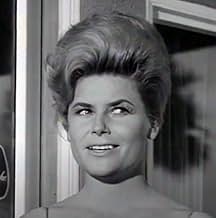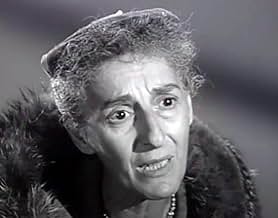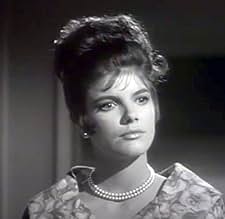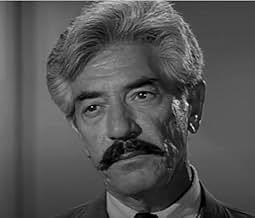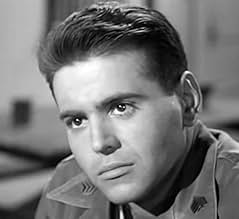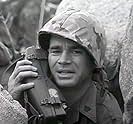Ajouter une intrigue dans votre langueThe trials of a young U.S. Marine Lieutenant and his comrades at Camp Pendleton.The trials of a young U.S. Marine Lieutenant and his comrades at Camp Pendleton.The trials of a young U.S. Marine Lieutenant and his comrades at Camp Pendleton.
Parcourir les épisodes
Histoire
Le saviez-vous
- AnecdotesProducers wanted to follow the tradition of marketing this show by selling a license to produce tie-in toys based on it. They offered this license to Hasbro. Hasbro, however, knew that such license deals often ended up with large amounts of unsold inventory, as demand for the toys would die out once the series had started, or especially after it ended. However, they liked the idea of a military-themed toy line, and this inspired them to create G.I. Joe.
- ConnexionsEdited from The Battle of Gettysburg (1955)
Commentaire à la une
This early 60s series was, for the most part, a sober and thoughtful exploration of the life and responsibilities of a U. S. Marine Corps junior officer starting off his career in the postwar period of U. S. history. It addressed the struggles of a peacetime American military confronting the complicated demands of a Cold War world, at the time less than two decades removed from the transformative trauma of World War II. It was also one of the first series to deal with issues of race with what at the time could be considered unusual honestly. In the end, the series failed to attract a sufficient audience and only lasted one season. But what it led to, as well as what it COULD have led to, are more significant to TV history than most people might realize.
For one thing, it's most prominent co-star, Robert Vaughn (playing Lt. Rice's immediate superior. Capt. Rambridge), quickly came under scrutiny to play another Cold War hero...Napoleon Solo, The Man From U. N. C. L. E. In fact, both The Man From U. N. C. L. E. Book and Vaughn's own autobiography, A Fortunate Life, credit Vaughn's work in The Lieutenant as a primary reason why Vaughn was considered for and ultimately won his signature role as Solo in a TV series that became a hugely influential part of 60s culture. Vaughn actually found out he had been cast as Solo while still working on The Lieutenant.
Second, the failure of The Lieutenant to renew for a second season actually freed up primary producer Gene Roddenberry for his future success. The series was considered a quality production, which enabled Roddenberry additional leverage to create his next, and seminal production: Star Trek. Actors from The Lieutenant such as Leonard Nimoy, Majel Barrett, Nichelle Nichols and Walter Koenig became major cast members of Star Trek, and even the lead of The Lieutenant, Gary Lockwood, had a memorable guest star role in Star Trek's second pilot, "Where No Man Has Gone Before". There was talk of Lockwood being considered for the lead role of the captain of the Starship Enterprise, a possibility that became rather moot when Lockwood was cast in another science fiction project that became a legendary motion picture: 2001: A Space Odyssey.
But another intriguing possibility for The Lieutenant's future, while never realized, is worth considering. The series was cancelled in the spring of 1964, mere months before the Gulf of Tonkin incident which drew the United States fully into the Vietnam War. Several episodes had already referenced the Vietnam War, and the last episode had Lockwood's Lieutenant Rice actually serving in Vietnam. So the question is, if the series had been renewed for a second 1964-1965 season, would it have become the first true American TV series about the Vietnam War? Would a peacetime military series that was often rather honest about U. S. military life have made the transition into a series about a real-life war? After all, in 1964 few fully understood the ramifications of the war, and what it would lead to in American society. What would such a series have become? It's a question that will never be answered, but it certainly is an intriguing aspect of this series to consider.
For one thing, it's most prominent co-star, Robert Vaughn (playing Lt. Rice's immediate superior. Capt. Rambridge), quickly came under scrutiny to play another Cold War hero...Napoleon Solo, The Man From U. N. C. L. E. In fact, both The Man From U. N. C. L. E. Book and Vaughn's own autobiography, A Fortunate Life, credit Vaughn's work in The Lieutenant as a primary reason why Vaughn was considered for and ultimately won his signature role as Solo in a TV series that became a hugely influential part of 60s culture. Vaughn actually found out he had been cast as Solo while still working on The Lieutenant.
Second, the failure of The Lieutenant to renew for a second season actually freed up primary producer Gene Roddenberry for his future success. The series was considered a quality production, which enabled Roddenberry additional leverage to create his next, and seminal production: Star Trek. Actors from The Lieutenant such as Leonard Nimoy, Majel Barrett, Nichelle Nichols and Walter Koenig became major cast members of Star Trek, and even the lead of The Lieutenant, Gary Lockwood, had a memorable guest star role in Star Trek's second pilot, "Where No Man Has Gone Before". There was talk of Lockwood being considered for the lead role of the captain of the Starship Enterprise, a possibility that became rather moot when Lockwood was cast in another science fiction project that became a legendary motion picture: 2001: A Space Odyssey.
But another intriguing possibility for The Lieutenant's future, while never realized, is worth considering. The series was cancelled in the spring of 1964, mere months before the Gulf of Tonkin incident which drew the United States fully into the Vietnam War. Several episodes had already referenced the Vietnam War, and the last episode had Lockwood's Lieutenant Rice actually serving in Vietnam. So the question is, if the series had been renewed for a second 1964-1965 season, would it have become the first true American TV series about the Vietnam War? Would a peacetime military series that was often rather honest about U. S. military life have made the transition into a series about a real-life war? After all, in 1964 few fully understood the ramifications of the war, and what it would lead to in American society. What would such a series have become? It's a question that will never be answered, but it certainly is an intriguing aspect of this series to consider.
Meilleurs choix
Connectez-vous pour évaluer et suivre la liste de favoris afin de recevoir des recommandations personnalisées
- How many seasons does The Lieutenant have?Alimenté par Alexa
Détails
- Date de sortie
- Pays d’origine
- Langue
- Aussi connu sous le nom de
- El teniente
- Lieux de tournage
- Sociétés de production
- Voir plus de crédits d'entreprise sur IMDbPro
- Durée1 heure
- Couleur
- Rapport de forme
- 1.33 : 1
Contribuer à cette page
Suggérer une modification ou ajouter du contenu manquant

Lacune principale
By what name was The Lieutenant (1963) officially released in India in English?
Répondre


